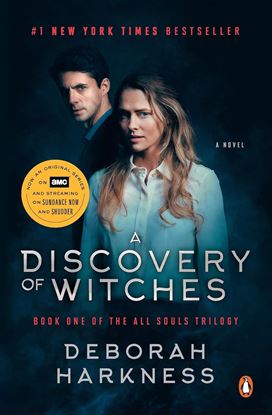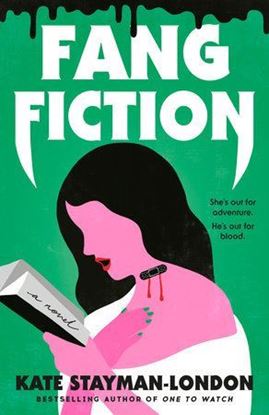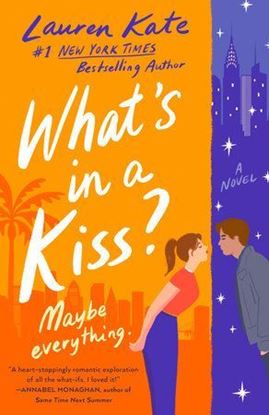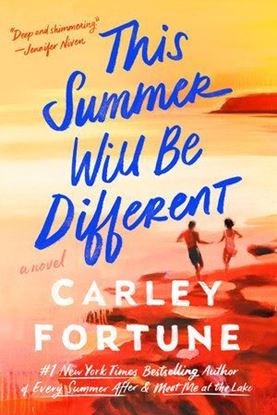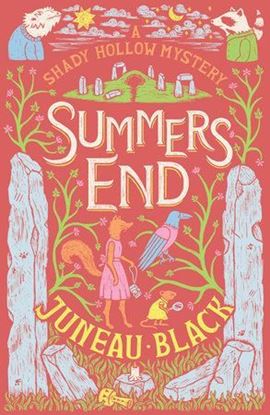

A DISCOVERY OF WITCHES (MOVIE-TI) (PB)
Deborah Harkness’s sparkling debut, A Discovery of Witches, has brought her into the spotlight and galvanized fans around the world. In this tale of passion and obsession, Diana Bishop, a young scholar and a descendant of witches, discovers a long-lost and enchanted alchemical manuscript, Ashmole 782, deep in Oxford's Bodleian Library. Its reappearance summons a fantastical underworld, which she navigates with her leading man, vampire geneticist Matthew Clairmont.
Harkness has created a universe to rival those of Anne Rice, Diana Gabaldon, and Elizabeth Kostova, and she adds a scholar's depth to this riveting tale of magic and suspense.
900
675
FANG FICTION
he’s out for adventure. He’s out for blood.
Tess Rosenbloom is no stranger to the dark. An assault survivor and grad school dropout, Tess spends her nights managing a chic Brooklyn hotel and her days reading her favorite vampire novels, Blood Feud. She even dabbles in online conspiracies claiming Blood Feud is real—it’s fun to hunt for clues! But deep down, Tess doesn’t believe vampires actually exist . . . until one walks through her door.
It turns out the sexy villain of Blood Feud is trapped, and only Tess can rescue him. Eager to escape her life, Tess agrees to help, and soon she’s on a secret island where the sun never shines, surrounded by deadly vampires—and most terrifying of all, she's falling in love with one of them. (Meanwhile, back in New York, Tess’s estranged best friend is having a sapphic paranormal affair of her own.)
900
675
ALL I WANT IS YOU
All Jessica has ever wanted is her own happily ever after. But until that happens, she spends her days as a small-time romance writer, penning satisfying Happily Ever Afters to soothe the heartache left by her ex-boyfriend Nick—also a romance writer and now her biggest rival—who has found success writing love stories without happy endings. It’s what he’s good at, after all . . .
So when their professional obligations bring them to a remote inn a few days before Christmas, they’re a little more than peeved, especially when they get trapped sharing a room in a snowstorm. But what’s more fitting for two romantic writers in a slump? Realizing the friction between them might be the only cure for their writer’s block, they decide to turn their frustration into fiction . . . and the pages start flying. But will Jess’s heart soar, too? Nick is the last guy on earth she should love . . . but what if he is really all she wants for Christmas?
850
638
WHAT'S IN A KISS?
This is not how Liv wanted to see Jake Glasswell for the first time in ten years. Once her high school rival and the prom date who humiliated her, now a successful TV personality, he’s more attractive than he has any right to be. And he’s her Lyft passenger.
Since the prom night kiss that never was, Liv’s life has not gone to plan. She deferred Julliard to be with her mom during a crisis, and now swears she’s happy as a recently furloughed drama teacher going on no-strings dates. This weekend she’s maid of honor to her best friend, Masha, and, of course, Jake is the best man. But when Liv glares into Jake’s eyes as Masha says, “I do,” the universe turns on its axis and Liv is suddenly living a version of her life where prom night was the beginning of her and Jake, not the end, and it turns out he’s the love of her life. The catch? Her mom and Masha hate her now. What’s in a kiss? Maybe everything.
850
638
THIS SUMMER WILL BE DIFFERENT
Lucy is the tourist vacationing at a beach house on Prince Edward Island. Felix is the local who shows her a very good time. The only problem: Lucy doesn’t know he’s her best friend’s younger brother. Lucy and Felix’s chemistry is unreal, but the list of reasons why they need to stay away from each other is long, and they vow to never repeat that electric night again.
It’s easier said than done.
Each year, Lucy escapes to PEI for a big breath of coastal air, fresh oysters and crisp vinho verde with her best friend, Bridget. Every visit begins with a long walk on the beach, beneath soaring red cliffs and a golden sun. And every visit, Lucy promises herself she won’t wind up in Felix’s bed. Again.
850
638
SUMMERS END (SHADOW 5)
It’s late August in Shady Hollow, and intrepid reporter Vera Vixen agrees to chaperone the school’s annual field trip to Summers End, an ancient tomb built by an early woodland culture. Naturally, her good friend Lenore Lee comes along to help her.
But when the group enters the tomb one morning, they find a corpse that is distinctly more. . . modern than expected. Digging deeper, Vera and Lenore discover that the deceased was involved in the recent excavation at the site, and very unpopular with their colleagues—including Lenore’s sister, Ligeia. Now the fox and raven must delve into the dark world of academia and archaeology to clear Ligeia’s name. Some creature at Summers End thought they were clever enough to get away with the perfect murder. Can Vera and Lenore unearth the truth in time?
850
638

